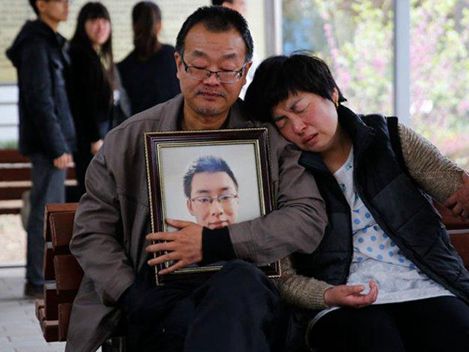
Wei Zeixi's parents are holding Wei's picture at his funeral. His father told Caixin on May 1 that since their son had gone, they wanted nothing but a peaceful life. Photo: Weibo
China’s online community was outraged by the death of a 21-year-old college student recently who was diagnosed with synovial sarcoma in 2014 and had been undergoing a cancer treatment which he found through the largest search engine Baidu, China’s equivalent of Google.
The student, Wei Zexi, believed the treatment to be his last chance to survive. An advert from the Second Hospital of the Beijing Armed Police Corps on Baidu claimed it to be a technique introduced from Stanford University. However, the treatment turned out to be ineffective on Wei even after Wei’s family had spent nearly 200,000 yuan (about $31,150) on it.
After he posted his treatment experience on question-and-answer platform Zhihu, China’s equivalent of Quora, Wei was told by an American user that this treatment, known as DC-CIK (dendritic cell and cytokine-induced killers) has already been removed from most American hospitals.
The issue put Baidu under public scrutiny and the company was blamed for lacking ethical responsibility and advertising hospitals and medical information without checking the credentials.
It was not the first time that Baidu outraged the public. The company was earlier criticized for selling the management rights for an online forum related to hemophilia to an unlicensed private hospital.
The Cyberspace Administration of China (CAC) said on Monday that it has dispatched a team of investigators which also included the State Administration of Industry and Commerce and the National Health and Family Planning Commission to Baidu over the Internet giant’s ethical responsibility, according to state-owned Xinhua News Agency.
Wei, a former computer science major at Xidian University in northwest China’s Shaanxi province, died on April 12. Yet public debate has simmered ever since and was ignited again by an article titled A Young Man Died in the Hands of Baidu and Military Hospital circulated on WeChat Moments, a messaging platform owned by Tencent, during April 30 and May 1.
While the article once again raised questions about Baidu’s “pay to play” advertisement mode, in which the more a bidder pays the more likely it will be ranked higher on Baidu search results, it also revealed the contracted relationship between the oncology department of the military hospital and two private hospitals (KangXin Hospital Investment and Management Co., Ltd, and Shanghai Claison Bio-tech Co., Ltd) registered under Putian (Chinese) Health Industry Association established in June 2014 with around 8,600 private hospitals as its members throughout the nation.
The founding of Putian (Chinese) Health Industry Association followed the large-scale establishment of private hospitals by three major business families (represented by Zhan Guotuan, Lin Zhizhong and Chen Jinxiu) from Putian, a city in China’s Fujian province which is notorious for being home to hundreds of people with no medical certificates working in many military or state-owned hospitals since 1990s.
Experts say that the subcontracting of specialized departments of some of China’s state-owned hospitals and military hospitals by the Putian medical collective resulted from a cut in government budget for state-owned and military hospitals in the 1980s while they got more independent operation rights at the same time.
When several specialized departments in the hospital would incur losses, they would commission a private hospital to subcontract such departments in order to turnaround the losses, according to some experts.
While such kind of relationship between state-owned or military hospitals and Putian medical collective is not a secret in China, it would definitely generate “social tumor” together with Baidu’s “pay to play” advertisement mode, according to an expert quoted by ifeng.com.
“On the surface it seems that the patients were drawn to the hospitals through the Baidu ads, but behind the scene it was the private hospital under the Putian medical group that was manipulating all of this process without showing up in the public. In this way, people were lured to such hospitals because they trust the military and Baidu,” the expert said.
So far, it is not yet known whether the controversial treatment deteriorated Wei’s health condition and led to his demise, but Baidu on Sunday had said through its Weibo account that it had filed a request for the hospital to be investigated, and would “fully support Wei’s family should the investigation confirm malpractice at the hospital.”
The issue became a hot topic on China’s largest social media Sina Weibo on Monday and Tuesday with several hashtags like Wei Zeixi Baidu Promoting Issue and Wei Zexi Issue. While people expressed regrets for the young man, they also slammed Baidu’s profit-driven advertisement mode, and turned the public attention to the triangular relationship between Baidu, the state-owned or military hospitals as well as the Putian medical group, with many calling for prompt medical reform in China.
“Wei, rest in peace! And I hope your leaving can finally summon the arrival of medical, propaganda and media communication reform in China,” @无梦枕青云 said.
“Don’t exaggerate Baidu’s wrongdoing because the biggest threat is the lack of government supervision. If there is no relevant regulations to censor the whole industry, there would be a lot of ways to do the promotions,” noted @绝对加特伏.
“I am an atheist, but I pray for revenge in this issue. I hope all those related to this issue including the medical supervisors, staff at Baidu, the hospital, KangXin, and Claison can hear the cry of We Zeixi and other victims in the midnight,” said other.
| Touched | Sympathetic | Bored | Angry | Amused | Sad | Happy | No comment |